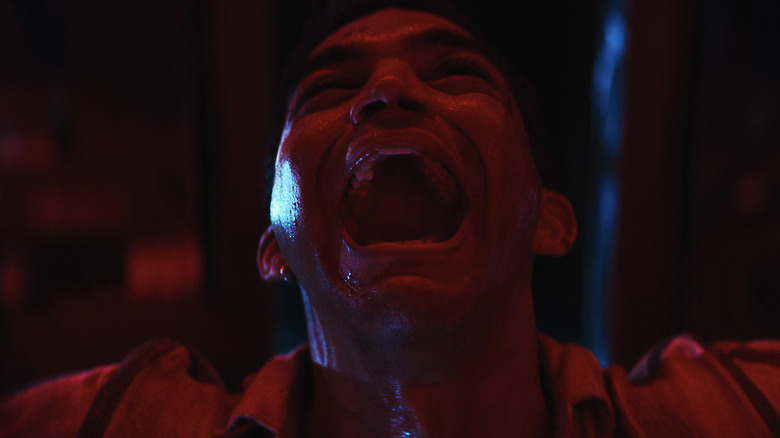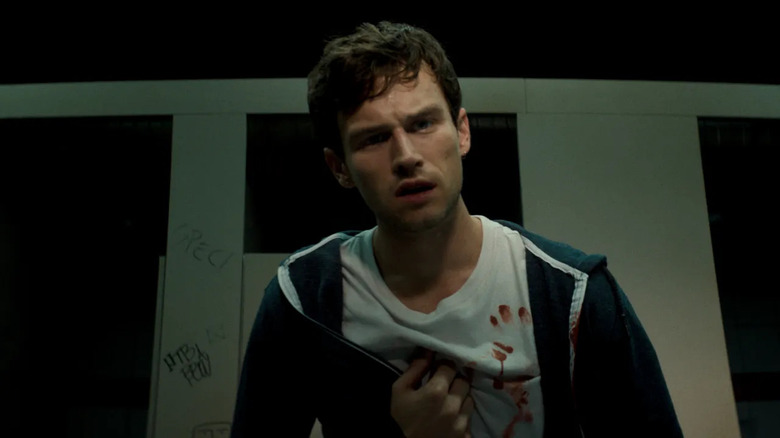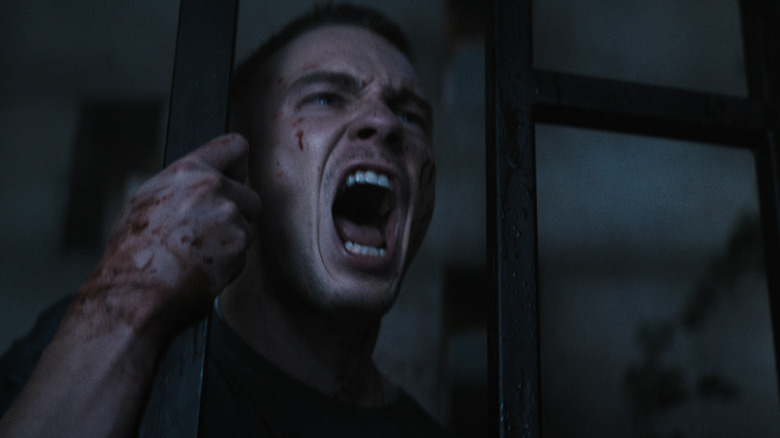Brandon Flynn And Adam Faison On Joining The Queer Horror Legacy Of Hellraiser [Interview]
Warning: This interview contains mild spoilers for "Hellraiser."
When Jamie Clayton was announced as taking on the coveted role as Pinhead/The Hell Priest/Lead Cenobite in "Hellraiser," there was a ridiculous display of stupidity as transphobic fans lamented the franchise had "gone woke." The hilarious irony, of course, is that "Hellraiser" creator Clive Barker is one of the most openly gay horror creators in history, and has been extremely vocal about how the underground gay BDSM scene was a huge influence on the aesthetic of the Cenobites.
LGBTQIA+ creators are foundational to the birth and success of horror as a film genre, so for anyone to decry "Hellraiser" as having somehow turned political is not only ahistorical, it's so beyond ignorant that it's worthy of mockery. While the latter installments of the "Hellraiser" franchise aren't nearly as embedded in gay subculture as the first few, there's no denying that "Hellraiser" does not exist without the presence of queerness.
In David Bruckner's new take on the "Hellraiser" series, audiences are introduced to Brandon Flynn's Matt and Adam Faison's Colin. The two characters are in a relationship, living their best gay lives together in an apartment they share with their roommate (Selina Lo) and Matt's sister Riley (Odessa A'zion), who is crashing there in the midst of her addiction recovery.
Hellraiser has ALWAYS been gay
An unfortunate reality is that there are an alarming number of people who don't realize just how gay "Hellraiser" films are, and have always been. These are definitely the same people who couldn't believe Rob Halford of Judas Priest fame was gay, despite the fact he looks like he shops exclusive at Cenobites-R-Us. Regardless, Bruckner wanted to include the franchise's queerness in a bold way, by including a canonically gay relationship of non-Cenobite characters.
I was fortunate enough to talk with both Flynn and Faison about their roles in the film, and what it means for them both as out-actors to be a part of such a legacy. "Dude, it's really dope," said Faison. "I mean, it's so nice to just be able to live and not be coded in metaphor." Faison also noted that while Barker was truly brilliant for being able to introduce unquestionably queer themes into "Hellraiser" without having to outright name it, that it's refreshing to be able to include that identity without subtext. "It's nice to be able to now just fully live and then also don't have to explain why we are, who we are, why we're in this world," he continued. "We're just in it."
Gay and prestigious
Flynn echoed that the "Hellraiser" films are viewed as "prestigious" by many queer horror fans and said the Matt and Colin relationship "feels almost both complete and the beginning of something else as well." Flynn continued by acknowledging the voices of the past, as well as the current creative team:
"There are queer artists involved in making this movie that started as a book that is very much a queer man's metaphor for what he experienced, and hopefully, it's the beginning of a lot more of that unraveling and unwrapping. I don't know if there's a future for 'Hellraiser' to continue, but if there is, we have a sweet spot."
Faison agreed, and loved that the couple's relationship is able to exist without being the central plot point. "It's just really good storytelling," he said. "I was really overwhelmed just emotionally in a really beautiful way when I read it that [my character] has agency and he's a part of the storyline and he is not just sort of written off within a couple scenes and killed off in a fun way as a joke." So no, "Hellraiser" did not fall victim to "the gay agenda," but it does provide us with queer characters to root for who aren't also pain-seeking sadist interdimensional demons.
Not like that's a bad thing.


